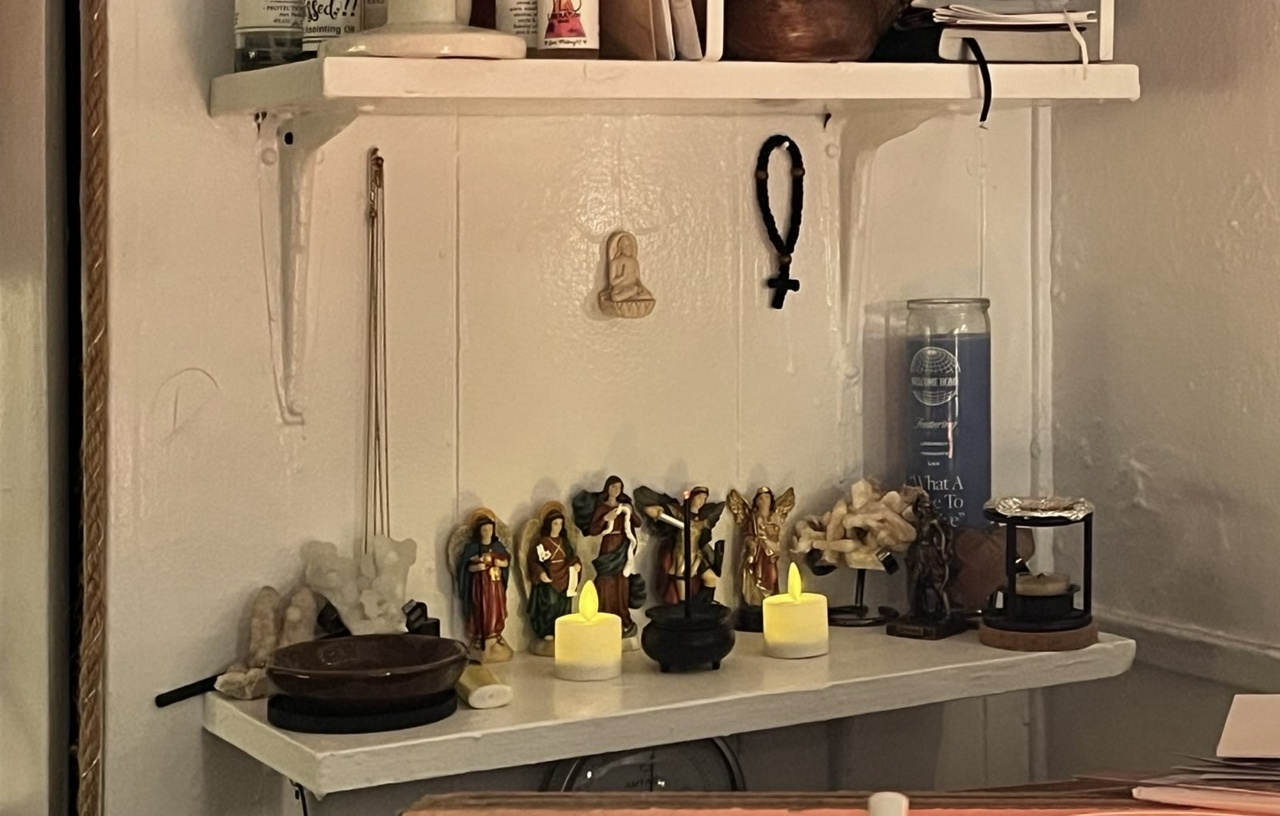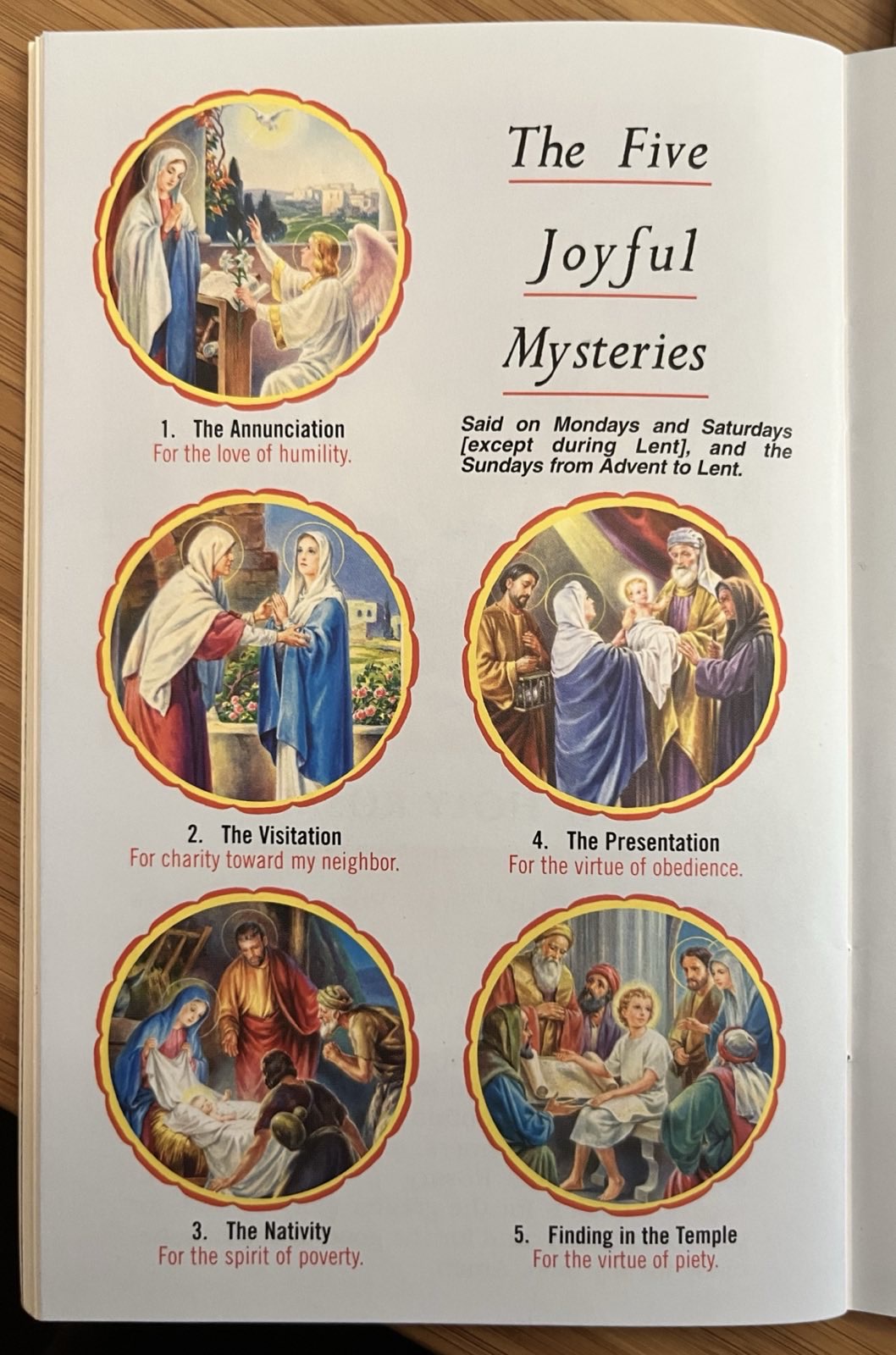healthy boundaries are the only virtue
I am not going to struggle through an attempt to explain my personal cosmology. I can tell you that I'm not Catholic, but my adoptive dad was, and I do like the props. I am especially persuaded by Catholicism's veneration of a strong female character—a quality sorely lacking in my own evangelical upbringing. But what I really appreciate about Catholicism is the canonization of prayer. If the words are already written out for you, and everyone else is saying the same synchronized words along with you, surely a Most High God will hear your collective voice the loudest.

All this preface is just to explain that, earlier today, I'd sat down to pray the novena to "Mary, Untier of Knots," and that it is not cultural appropriation for me to do so. I adore my Mary figurine. She stands taller than the other archangels, but not taller than She-Ra. The statue is apparently attempting to untangle a roll of paper towel—or climb out a window using bedsheets?—but the original painting is numinous.
This was going to be my third time going through the Untie Me novena. I began with the Act of Contrition and Prayer Asking for Conversion: "I renounce every temptation to harden my heart; I want to find no anger in my heart, no bitterness, no self-pity." So far, so good.
With my pre-prayer complete, I flipped to Day One. "O Virgin Mary," I started. Then I read ahead. For centuries the Church has honored you as the new Eve, she who with her faith and obedience untied that which Eve, by her disobedience and her lack of faith, had caused to be tangled. I mumbled this against my will. "More like ignorance, really," I said under my breath. I went on to the next paragraph.
"I recognize that often, in my own life, I have acted foolishly and faithlessly." Valid. "I called out the words 'Lord, Lord,' but I have not sought..." I trailed off. I frowned. I called out the words "Lord, Lord," but I have not sought to discern the Will of God in my life and in my relationships. Hm. I skimmed the rest. I built my house on sand and not on the rock foundation of the Word of God. This might even be why I am faced with problems that I cannot overcome, that I cannot face all by myself.
No, I would not be reciting this out loud. I have done a profound amount of spiritual labor; I would not be convicting myself of something I had not done. I prayed the rest of the prayer without incident.
Now for the rosary. I don't actually know how to pray a rosary and have to google-search it each time, but I do have ten fingers, so that's a "decade," i.e. the maximum number of times I planned to repeat myself today. I opened this link and got down to it: trying to meditate on each concept in the novena pamphlet while simultaneously trying to keep my eyes on my computer monitor.
I'd just arrived at step 8 of the rosary, and I was already flagging. I glanced at the time; my Zoom appointment was starting in five minutes. I really did not have time for all this, I thought to myself grimly. All this rosary, I mean.
I glanced down at the pamphlet again and, this time, noticed the second of the "Five Joyful Mysteries"—which are I guess what you pray on Mondays.
For charity toward my neighbor.
I thought back to my charity toward my neighbor earlier this year: how I'd purchased his groceries once (toiletries, a pepper grinder), then had given him $100 to get his cable Internet connected, then had let him borrow my belongings, no questions asked. Now feeling entitled to the stuff in front of my apartment, he'd started walking off with—or breaking—whatever he liked. I told him to stop. But he wanted unlimited resources and attention, knocking on my door at all hours of the night. Exhausted, I told him to stop. I no longer answered the door, and my other neighbors stopped leaving their own apartments, too. Unable to recapture my attention, the neighbor began defacing my porch and leaving Blair Witch shit in the tree across from my doorway. More than once, he tried to break in: I was being terrorized. Finally, I left town; in my absence, the neighbor's behavior became so erratic that he was evicted. Now our building has mailbox locks, security cameras, a gate. He had lived here for four years.
"Hmm," I said to myself. I'm still processing the lesson here; all my neighbors are. I looked more carefully at the other 'joyful' mysteries.

The Annunciation. For the love of humility. As I recently discovered, the etymological root of humility is "dirt"—to be abased all the way to the ground. The opposite of humility is human dignity.
The Visitation. For charity toward my neighbor. We've covered this one in full.
I am returning to add this July 8 edit: I do stuff for my 80-year-old neighbor all the time—fix his TV, buy him fake gag barf. Every time he sees me, he thanks me again for the gift of a folding grocery cart, which he now uses as a walker as well as a carry-all. The only time I have ever snapped at him was when I was sitting there trying to google the model of the A/C I'd rolled over and heaved up his porch steps, so I could then give him a tutorial on how to use it. The real difference, besides the fact that I just enjoy his company, is that it's a pleasure to serve him; he isn't trying to force any obligation to him. I'm moving soon, so it seems fine to say all this.
- The Nativity. For the spirit of poverty. Wow, my earliest childhood must've been real virtuous, although that isn't the word I'd pick for it.
I thought about the "spirit of poverty"—a spirit that is actively prayed against in certain Christian deliverance ministry circles, as if it were a curse that could befall you, rather than a devotional vow of contentment and gratitude that one makes. I thought about how aspiring to a holy minimalism had resulted in ceding my own resources willingly, to everyone's detriment. I thought about how, more recently, I've actively fought against my own scarcity mindset (and its handmaiden, survivor guilt). I thought about how a sense of impending "lack" compels people to behave abhorrently toward one another, competing over perceived scarce resources—especially in an office setting, especially when business is crashing.
I thought about how the "love of money"—the root of all evil, they say—is in fact driven by the "spirit of poverty." Ominous.
The Presentation. For the virtue of obedience. Obedience is fine, as long as the rules themselves make any fucking sense. Otherwise, it's incoherent and arbitrary, complicity for complicity's sake.
Finding in the Temple. For the virtue of piety. I think I've already described scrupulosity OCD and Christian purity culture in enough detail for one lifetime.
I looked up and down this page aghast. These are the traits I have been blogging about, actively working to dismantle in myself, or at least to balance.
Oh yeah, balance. I was shamed and humiliated for being too proud, so I'd overcorrected into self-abasement. I felt selfish, so I'd overcorrected to righteous self-sacrifice. Obedience? I had tried and tried to comply with systems that do not want me in them—that had spat out what remained of me like gristle.
And here they were now, all my "virtues" splayed out: wide-open vectors for attack against the integrity of my own spirit and its resilience, all tidily tiled across the page. These are the knots! These are the knots I need undoing!
Suddenly this pamphlet wasn't so sweet. Suddenly it was giving "glorified self-abandonment." Suddenly it was giving "taking the peasantry down several more pegs." Suddenly it was giving colonization and strategic dispossession.
No, I would not be praying this sacrament with others.
Now I thought about the Lord's Prayer. I tried to remember something I'd once known, something I'd learned at the very start of the year. I wracked my brain. It'd had something to do with the difference between "trespass" and "transgression." At the time I had been thinking about boundaries—porous boundaries, being a poor steward of my own sovereignty. Low fences, open gates.
Ah, that was it. A trespass, which we are called to forgive, is a lapse, a misstep, an honest mistake. Healthy boundaries make it easy to forgive a misstep. You're all good! I forgot to show you where the fence was; that's on me. Maybe I didn't know where the fence even was. Thank you for finding it for me.
The original meaning of sloth, as seen in the Seven Deadly Sins, was the "abdication of duty." If I am not guarding the fence or the gate, then I have neglected my post. I'm supposed to express the invisible boundary to you. If you misstep because I haven't told you where the boundary is—if I'm just being passive-aggressive and hoping you'll notice—then I share the blame with you.
Although we equivocate between trespass (paraptoma) and transgression (parabasis), they are not the same word. A transgression is defined as conscious boundary-breaking: willful disregard, a deliberate violation of a law, no matter whether that law is interpersonal, legal, or cosmic. It's a crashing of the gates.
Repeated offense is the beginning of a hostile takeover. Usually this is when a sovereign nation breaks its alliance, or else declares war.